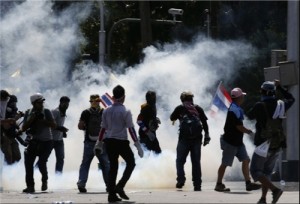 THE spectre of secession suddenly haunts Ukraine and Thailand, two countries where demonstrators have uncompromisingly battled corrupt or unresponsive rulers. Militant protests have set off chain reactions that may result in the fracturing of national territories and the creation of new states in what are now eastern Ukraine and northeast Thailand.
THE spectre of secession suddenly haunts Ukraine and Thailand, two countries where demonstrators have uncompromisingly battled corrupt or unresponsive rulers. Militant protests have set off chain reactions that may result in the fracturing of national territories and the creation of new states in what are now eastern Ukraine and northeast Thailand.Elsewhere, in India as well as in Egypt, anarchic forms of politics also seem to be prevailing. Apparently, all political institutions and processes must now bow to the will of �the people�, a category that seems more spacious than ever as previously impassive masses enter political life.
Arvind Kejriwal, the leader of India�s Aam Aadmi Party, who reigned for a tumultuous few weeks as Delhi�s chief minister, clarifies the demands of today�s freshly awakened people in his book Swaraj:
�It is now obvious that we have no control over the entire system. We cannot do anything against government employees. We have no say in government policies.
There is no participation in lawmaking, little control over the Parliament. � Our natural resources such as water, forest and land are being thoughtlessly sold off.
We have no control over that either. Is this democracy? Is democracy all about casting your vote once in five years and then letting these parties and their leaders rule the roost? � The people want a direct participation in power.
The people shall take decisions, and politicians and officials will have to implement them.�
Kejriwal echoes what many people, disempowered by their elected representatives, feel.
But are such forms of direct democracy sustainable? Can power be diffused so readily? And is the state strong enough to survive such an explosion of popular will?Iran may not seem the best vantage point to observe the convulsions in Ukraine and Thailand.
But travelling through the country last week, I often thought of its constitutional revolution in 1906 � one whose political legacy exceeds that of the Islamic Revolution of 1979 and offers more instructive lessons than any European revolution in why democratic upsurges often produce mayhem, followed in short order by tyranny.
The effort, led by Iranian intellectuals and activists, to check a centralised, arbitrary and inept monarchy was one of the very first political movements of its kind anywhere in Asia.
It succeeded in creating a constitutional framework � a principle of republicanism and a vocabulary of civil society and democratic rights that remain relevant in Iran to this day.
But no working government emerged, and factional fighting doomed the revolution as much as the geopolitical rivalries of Britain, Russia and the Ottoman Empire.
After much chaos, the proverbial �strongman� � inevitably, a soldier on horseback � emerged to reimpose order, and the sovereignty of the people was sacrificed to an even more centralised and powerful state.
In the last century, this script has grown oppressively familiar in countries where democratic assertion precedes nation building. It played out more recently in Egypt, where the country�s only strong institution � the military � deposed an elected government, terminating a euphoric moment of mass democracy.
We may yet see some similar unintended effects of the people�s will in Ukraine, Thailand and other countries with weak institutions of government.
The example of Iran after 1906 � in the long century of a steadily empowered state � clarifies why countries can lurch abruptly from giddy freedom to despotism and take a long time to recover.
Decentralisation � or the delegation of power to the real agents of change, the people � can engender chaos if there are no sturdy institutions of government already in place.
The anarchy that results can only encourage a longing for order, and a quick coalescing around ideals of ethnic and religious identity � one that authoritarian figures posing as ardent revolutionaries and nationalists stand ready to invoke.
The state then grows larger and stronger at the expense of the people, whose rights are expediently sacrificed to the interests of the former.
Intense mass politicisation caused in recent years by the venality and incompetence of ruling elites is turning millions of people around the world into rebels and secessionists. But they must be careful what they wish for from their irreparably weakened states and governments.
History tells us that the long-term as well as immediate consequences of many of their struggles will be violence and chaos, intensified great power rivalries, the bloody redrawing of territories, and the triumph of those who can stoke most efficiently the passions of blood and soil.
By Dawn
The Iran Project is not responsible for the content of quoted articles.










